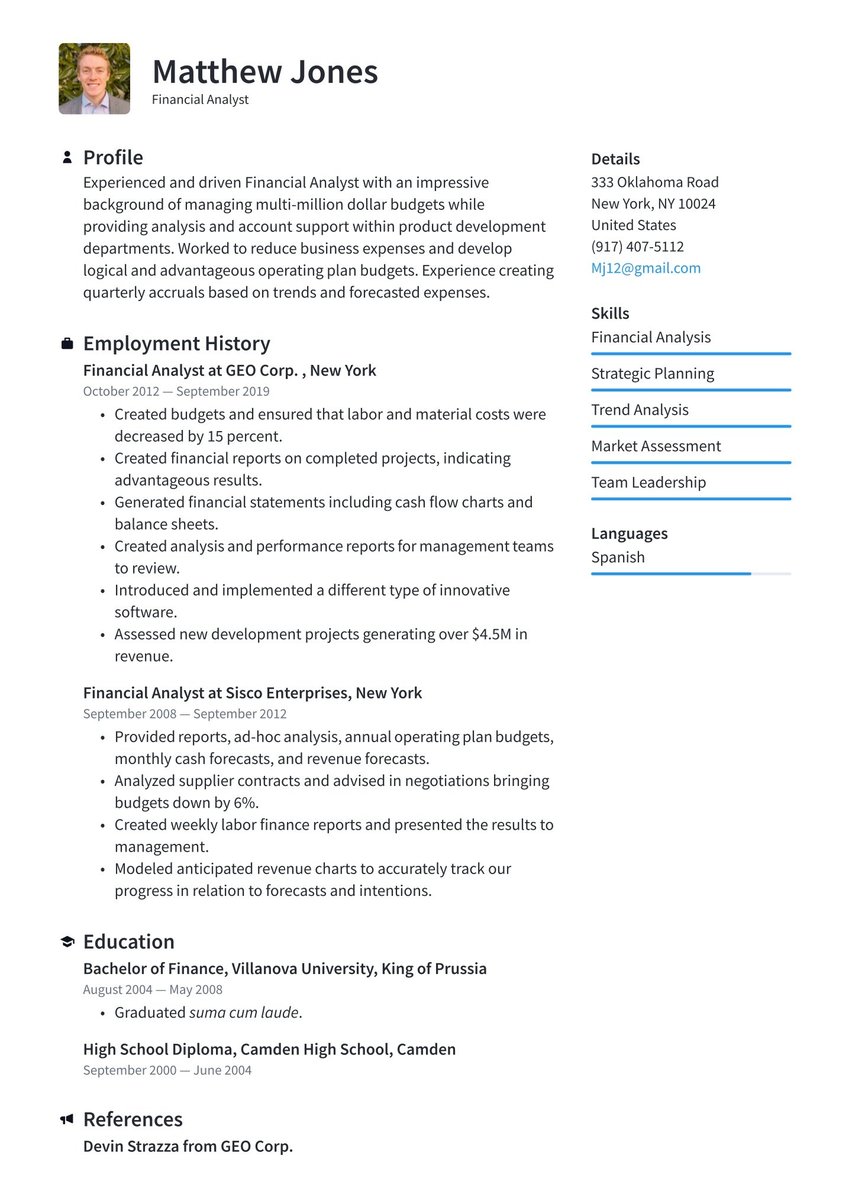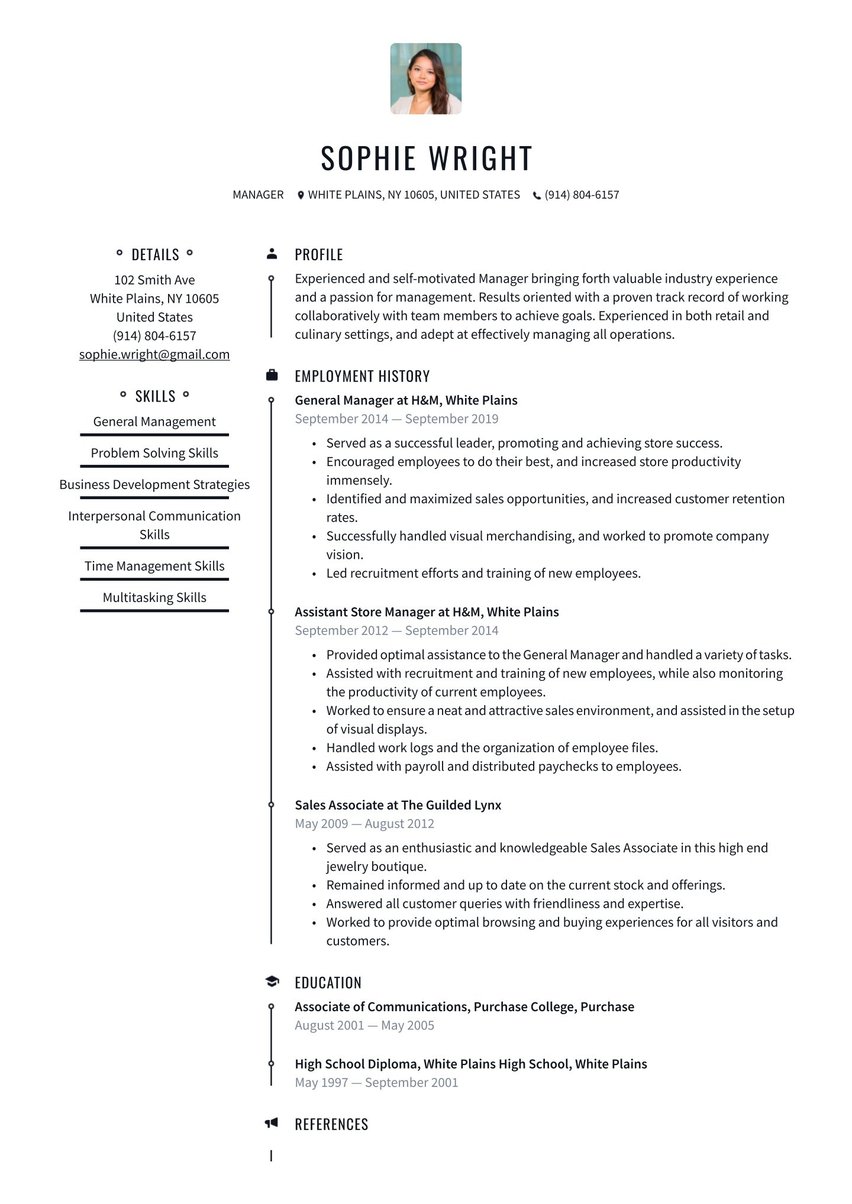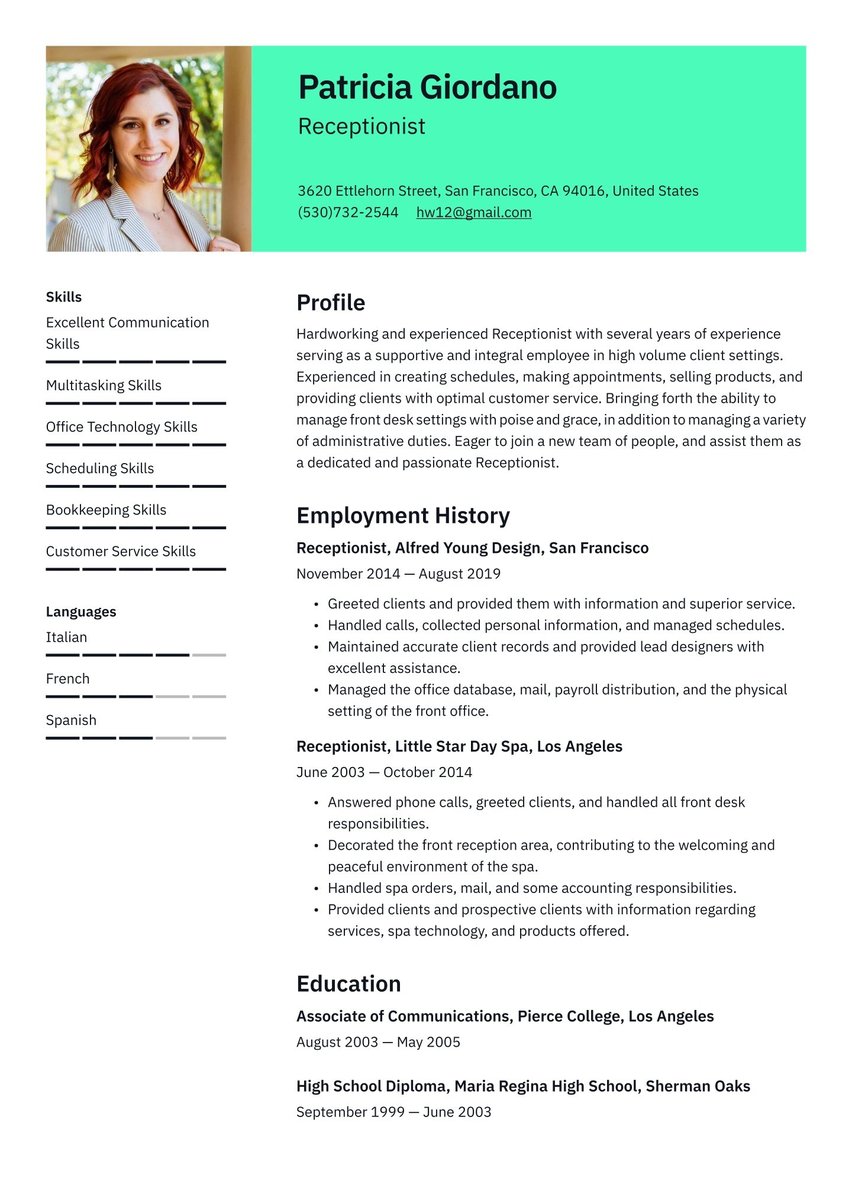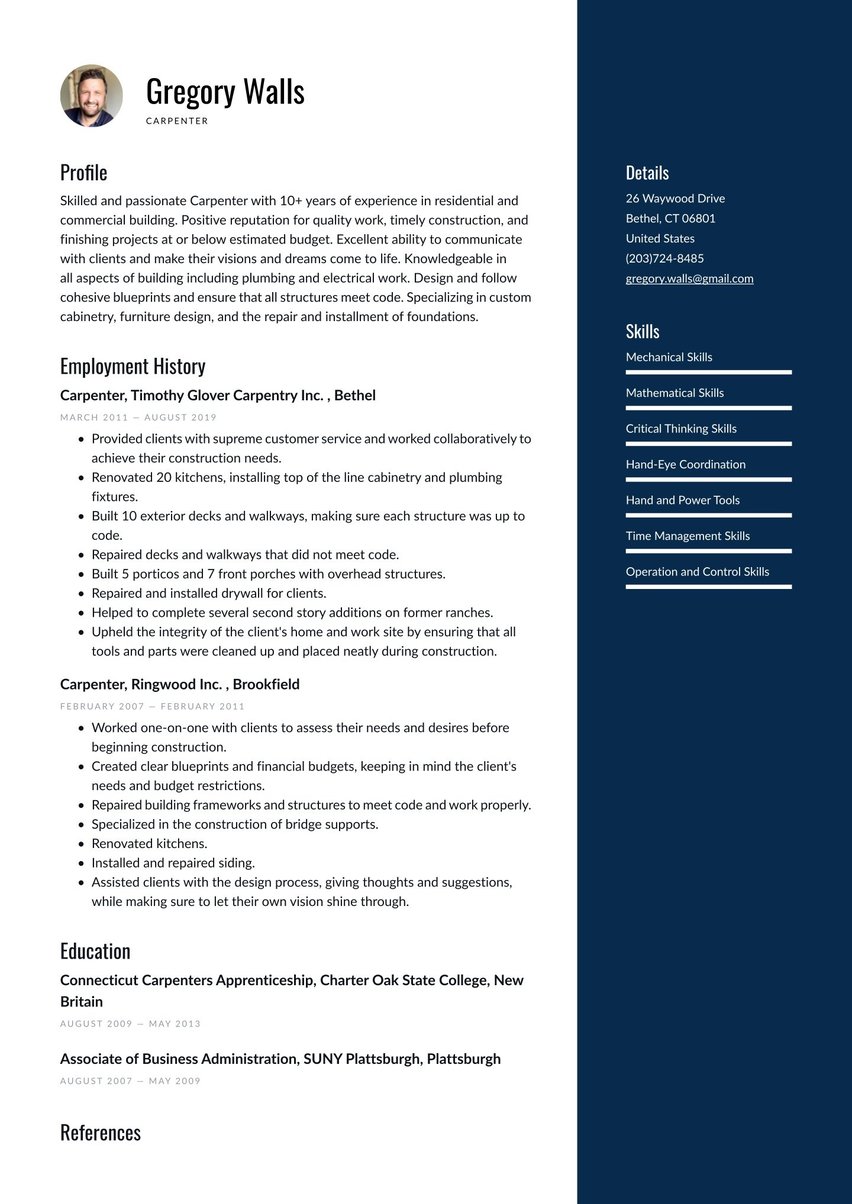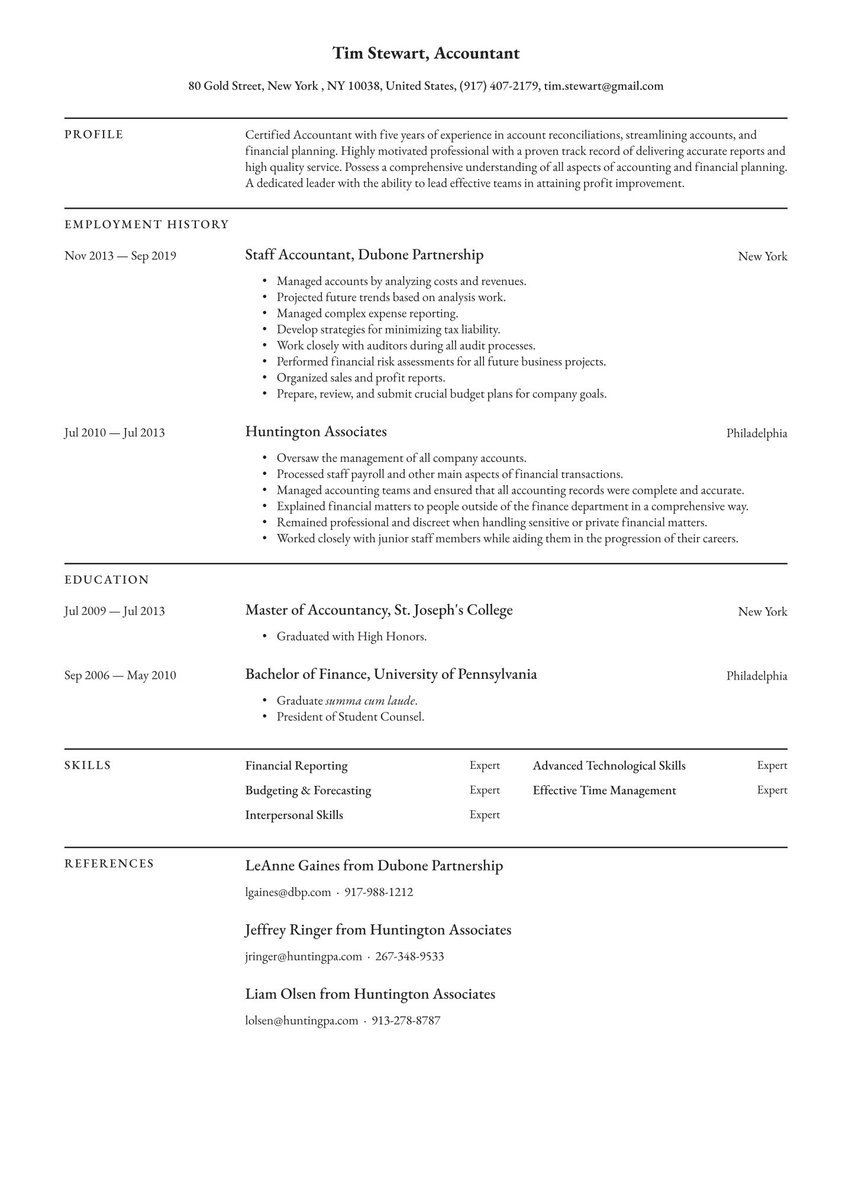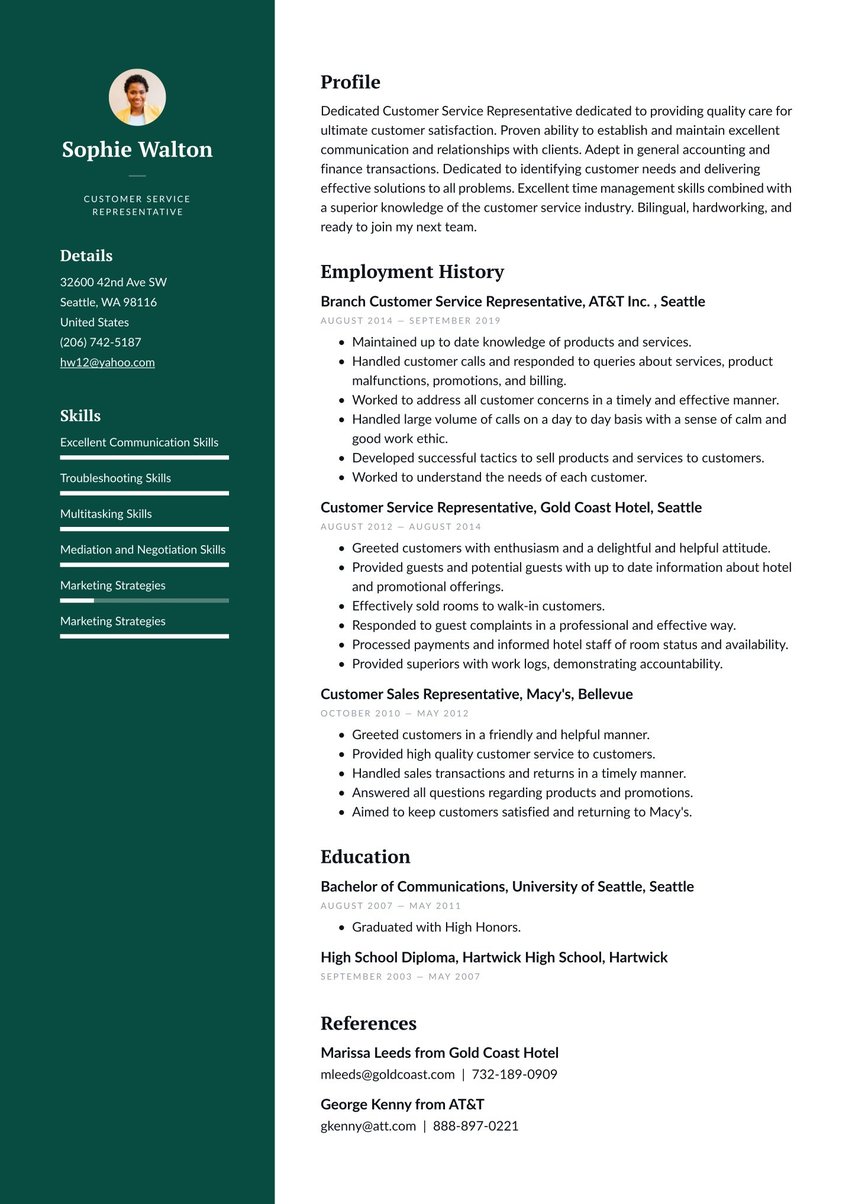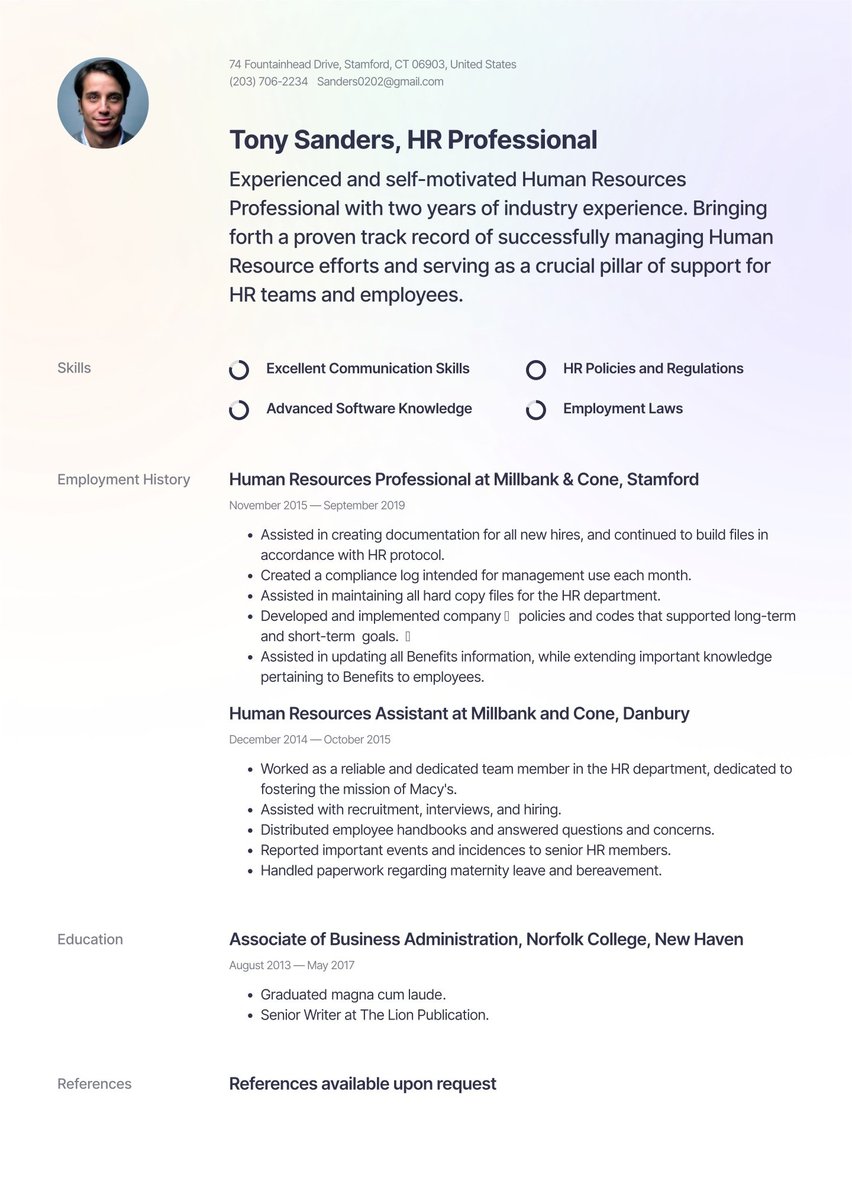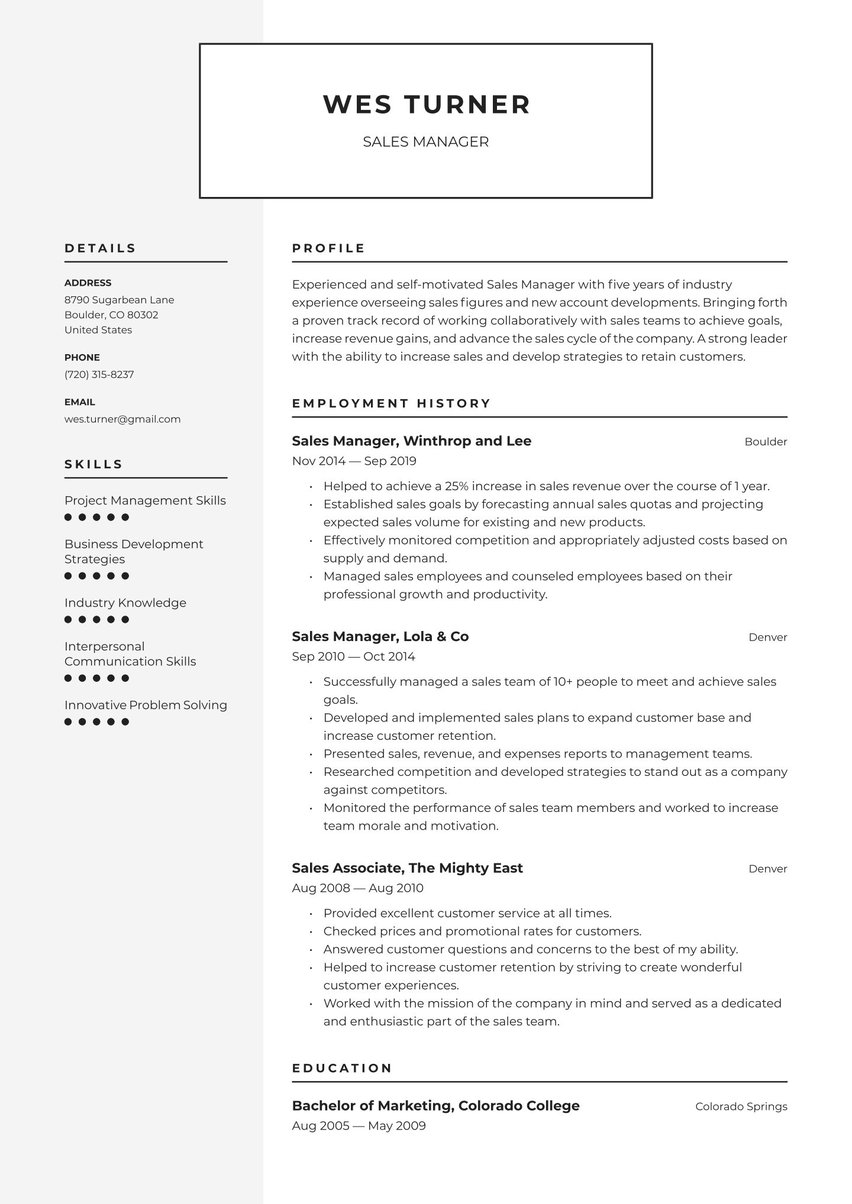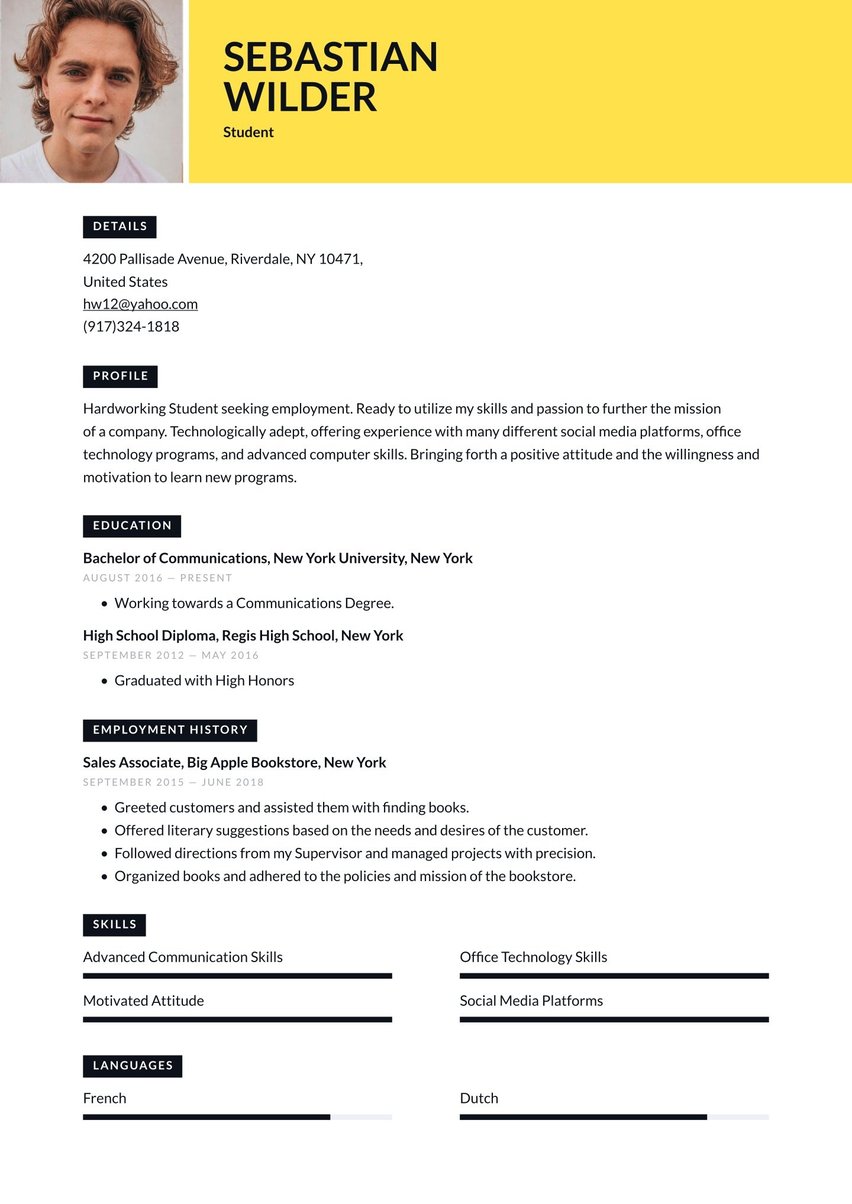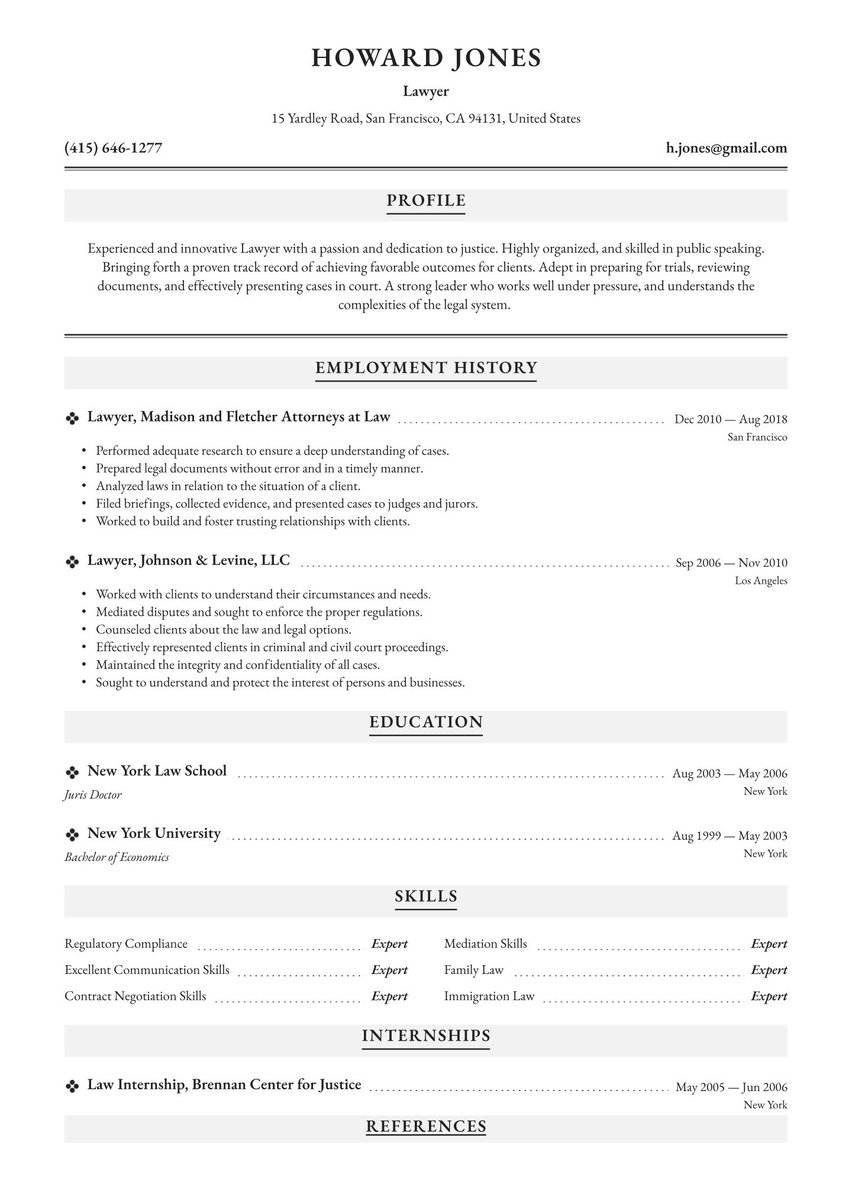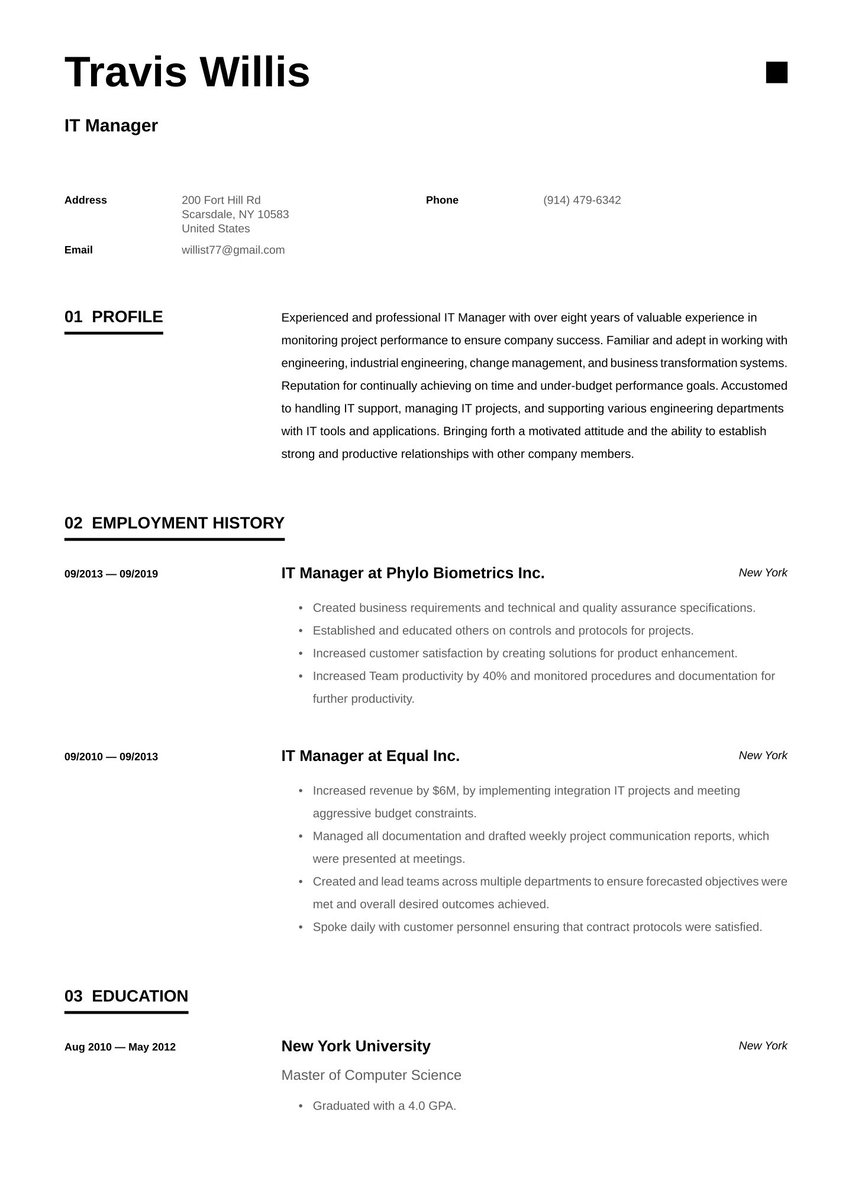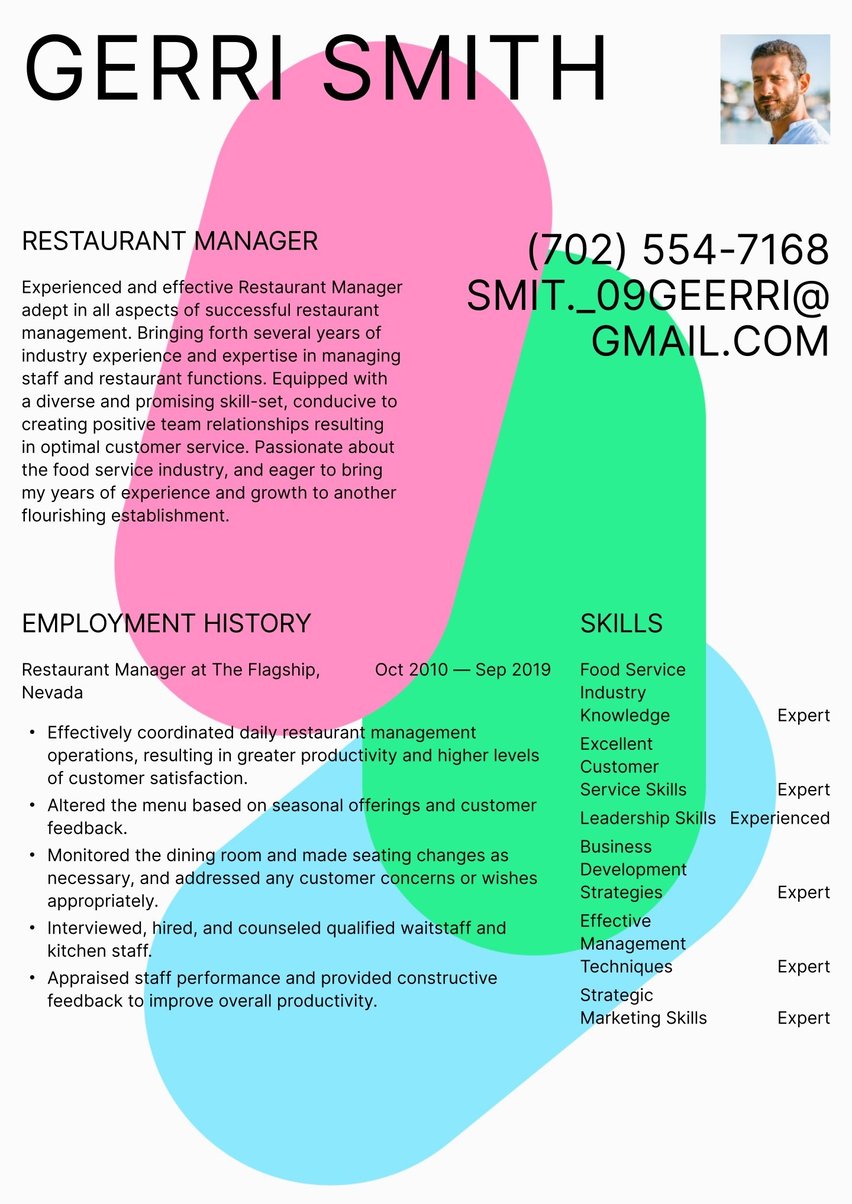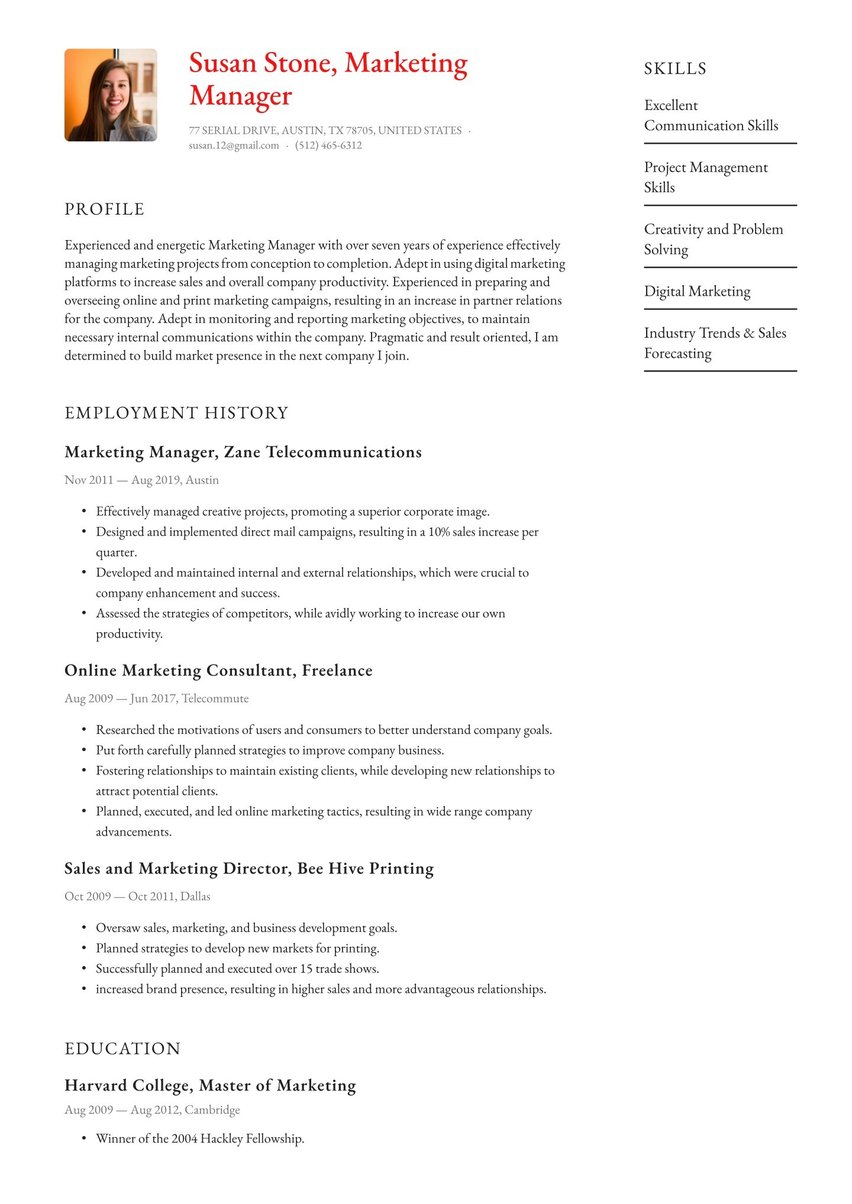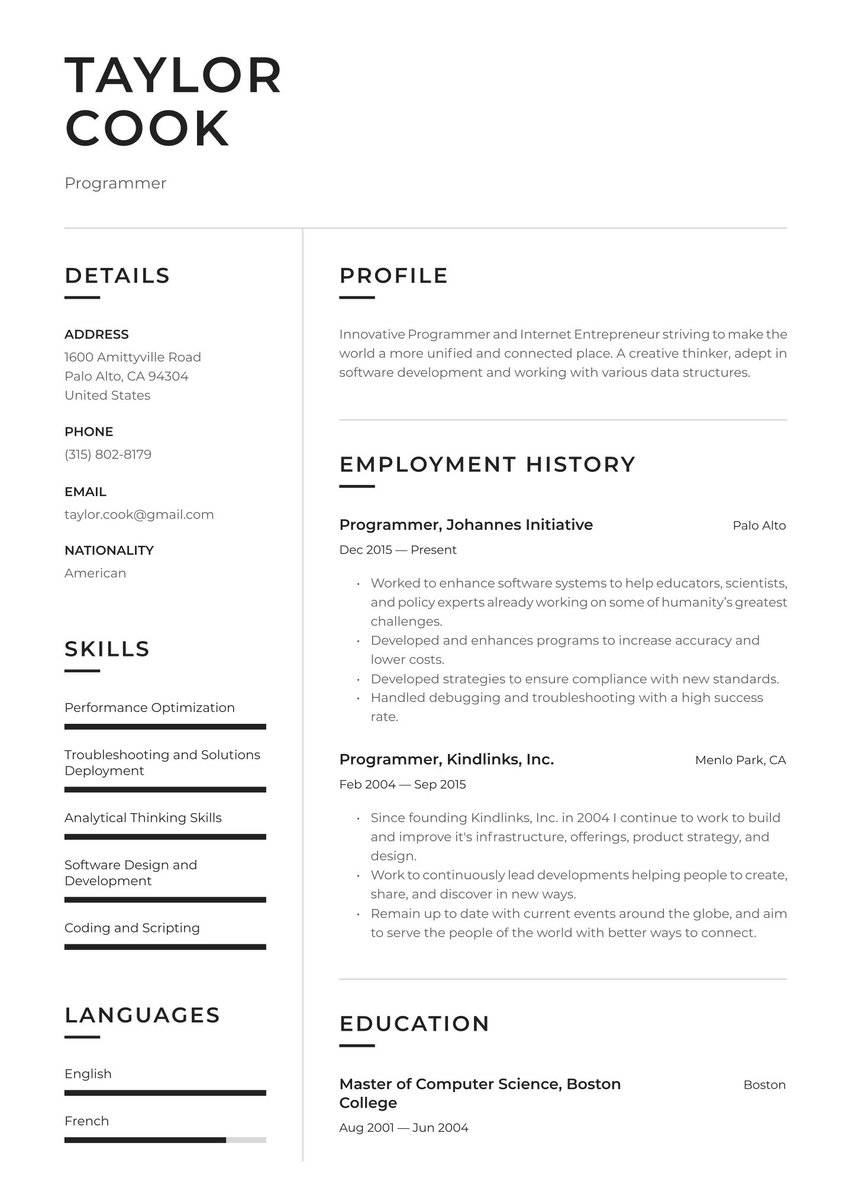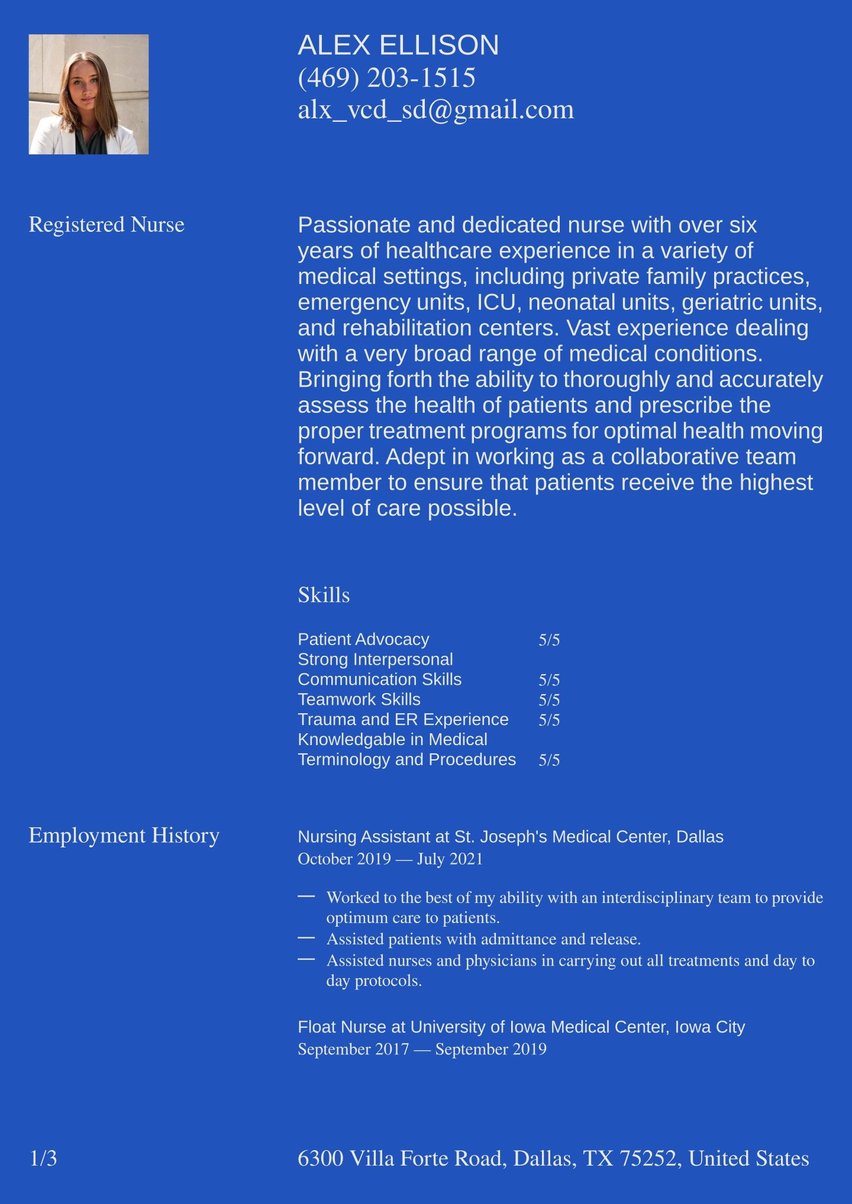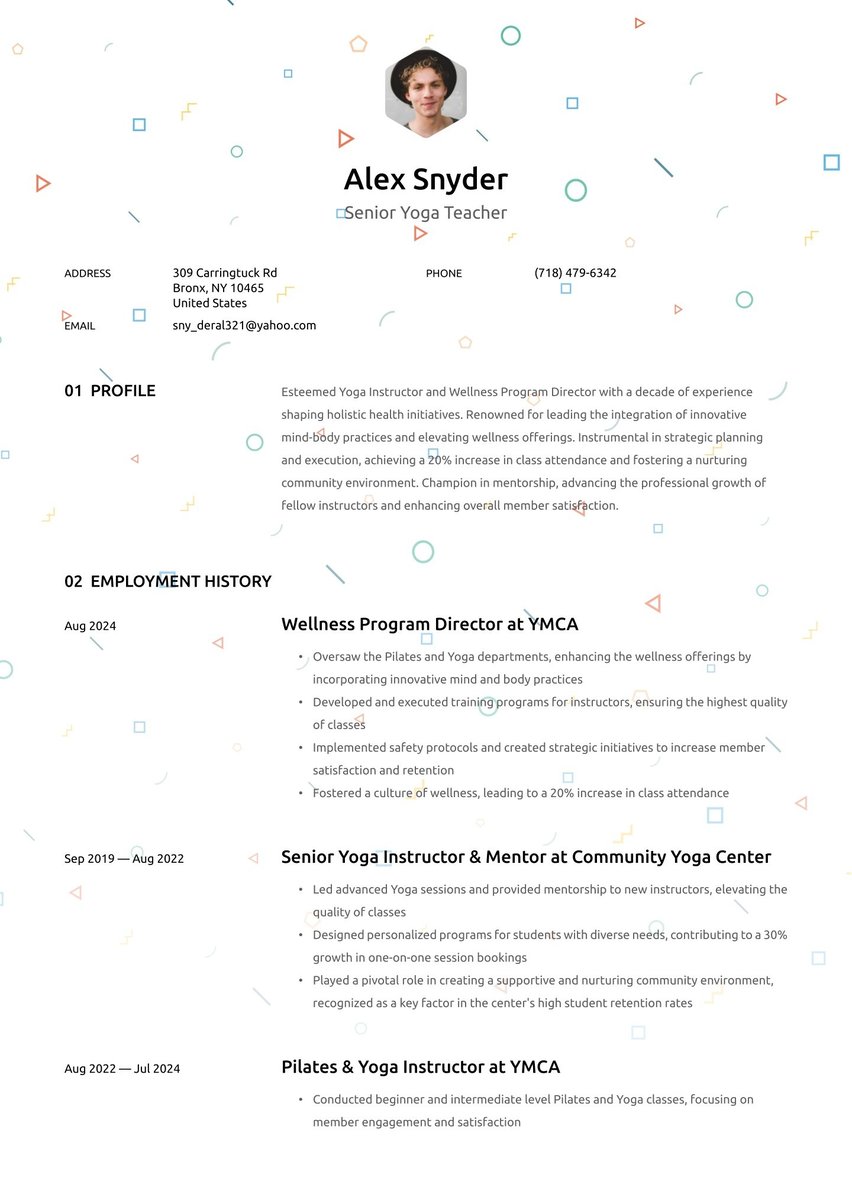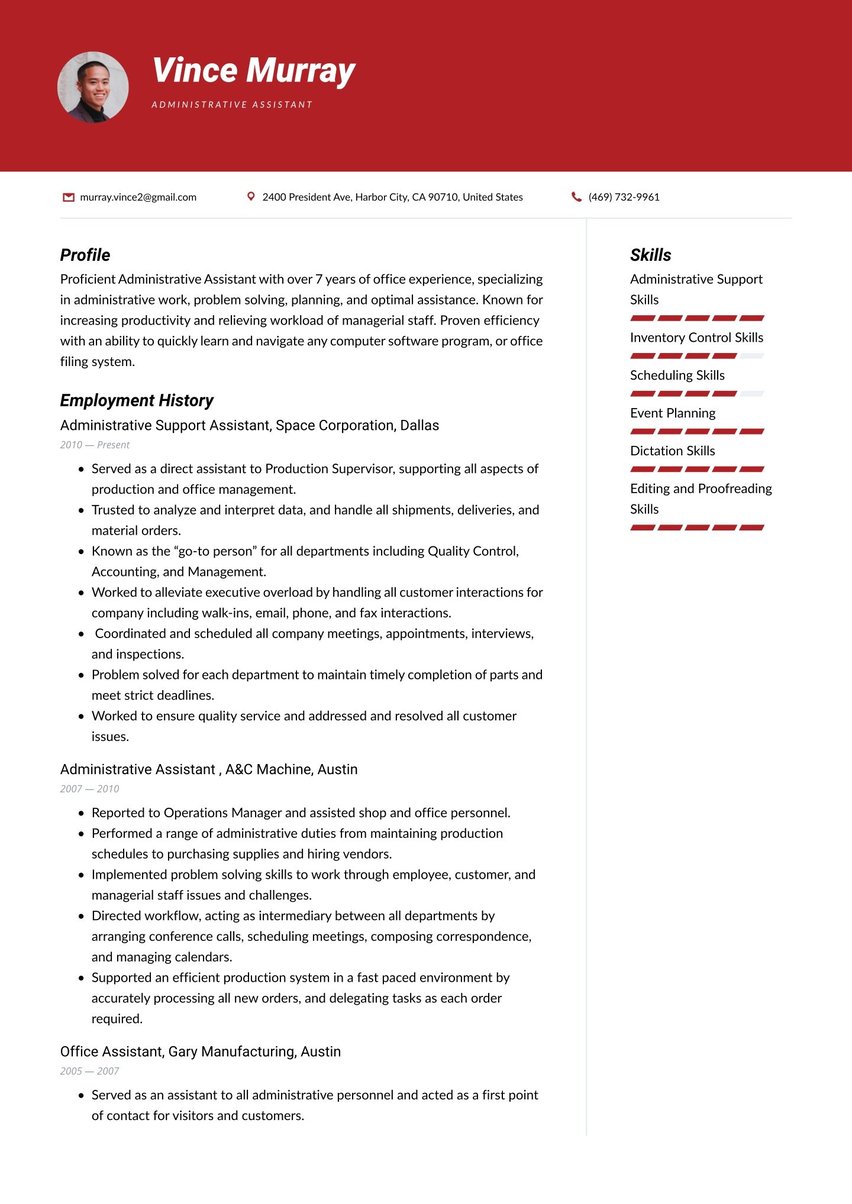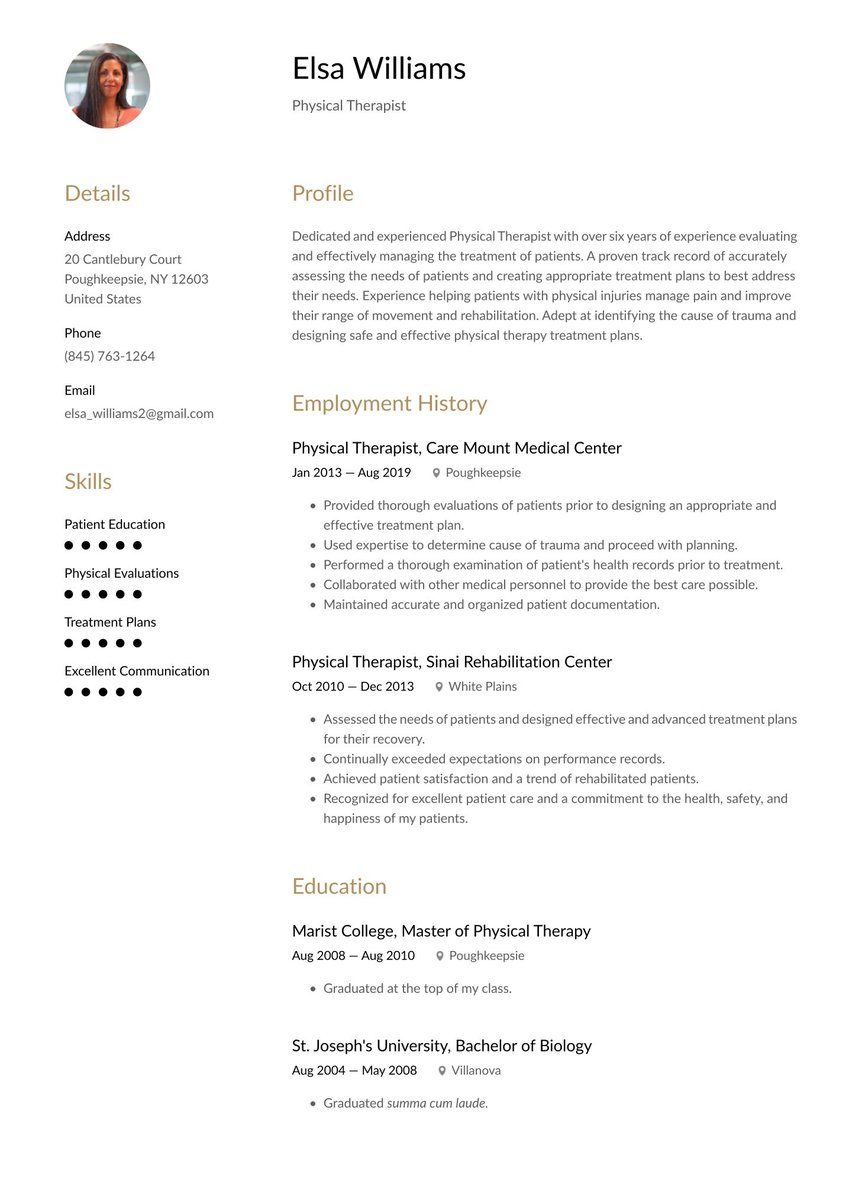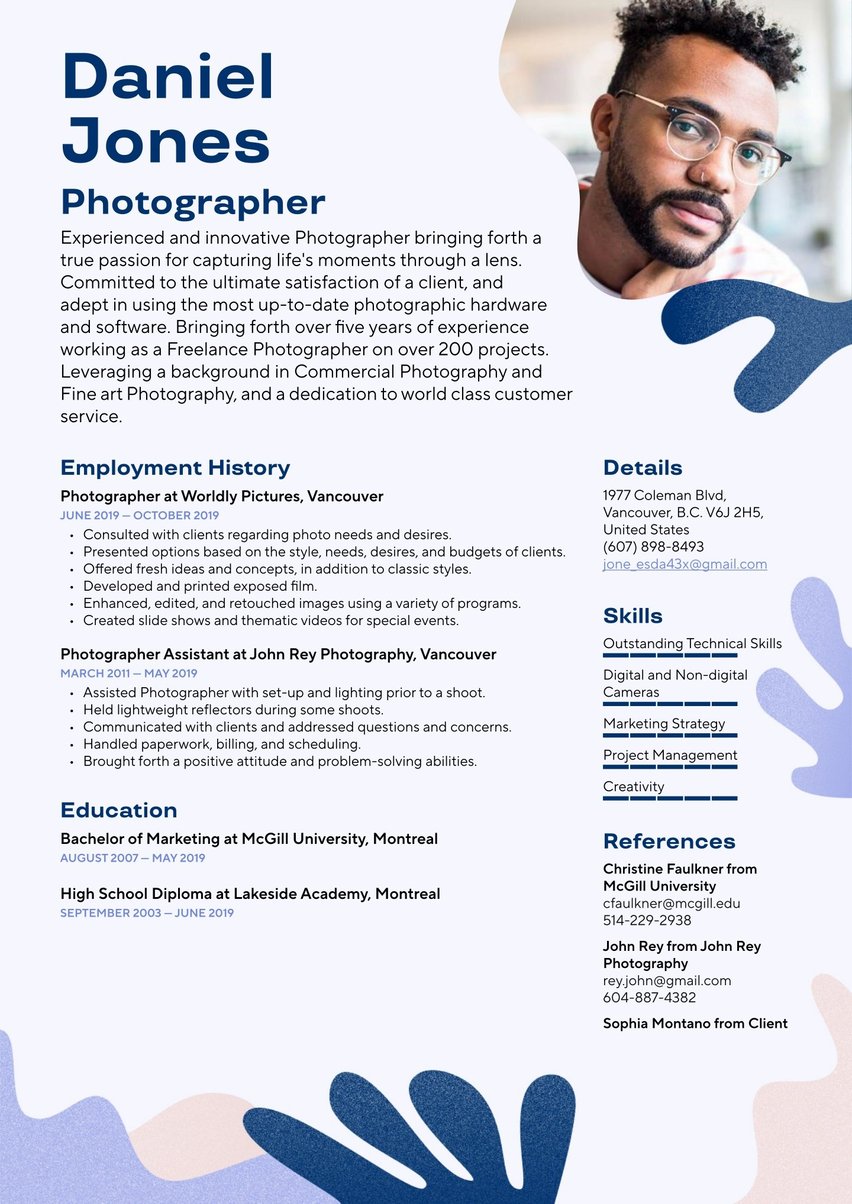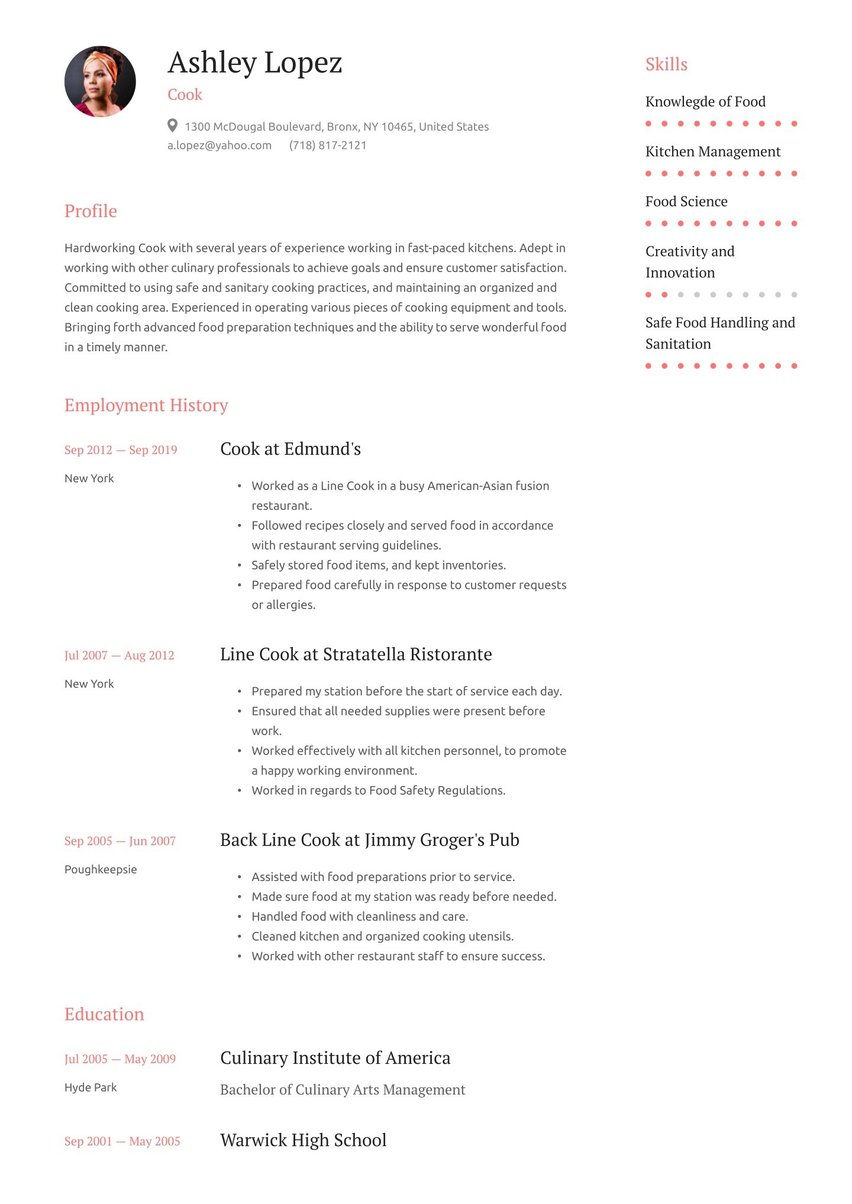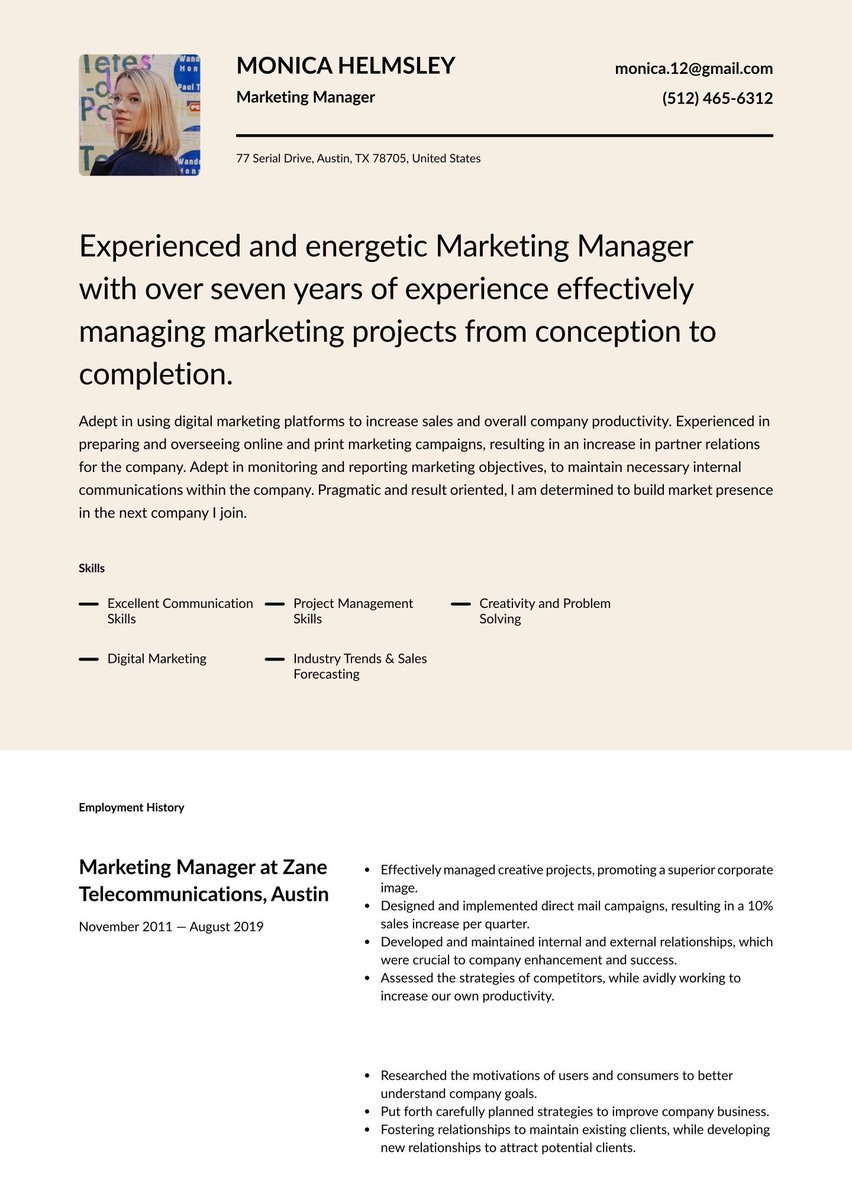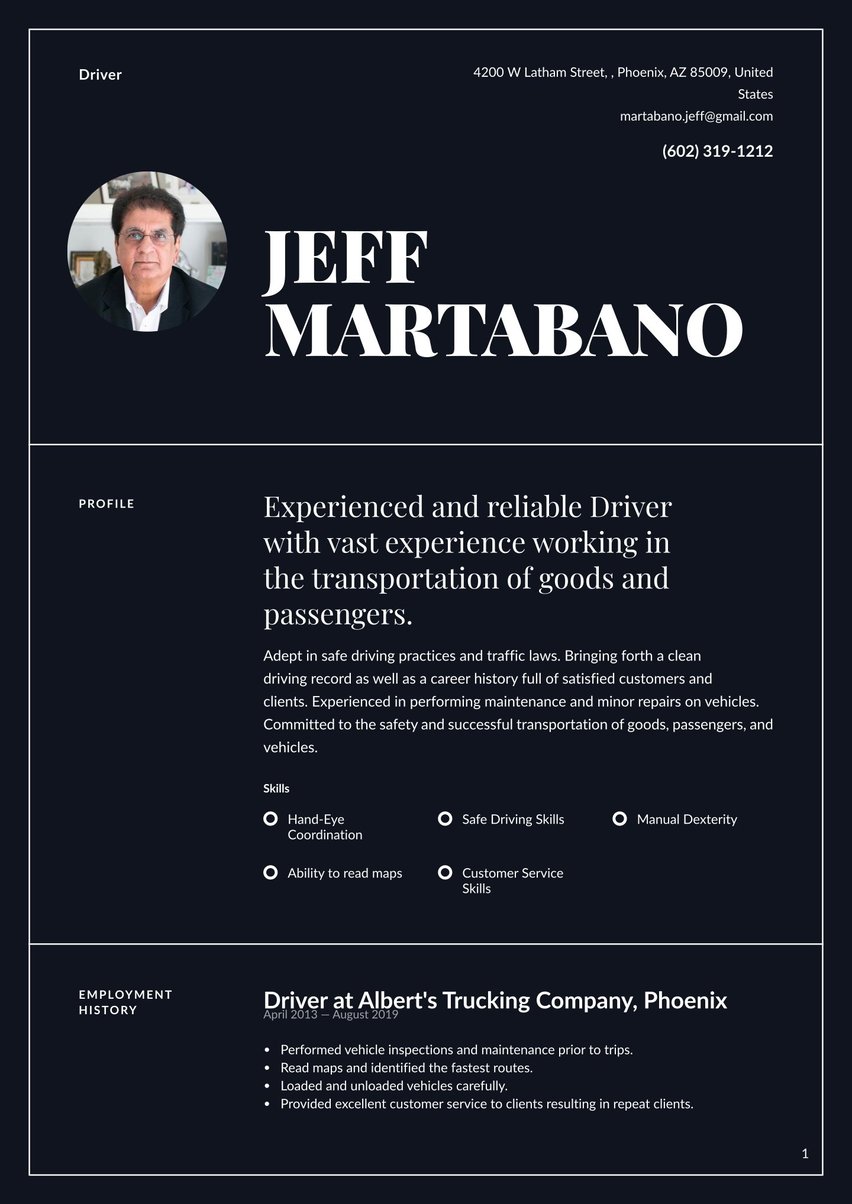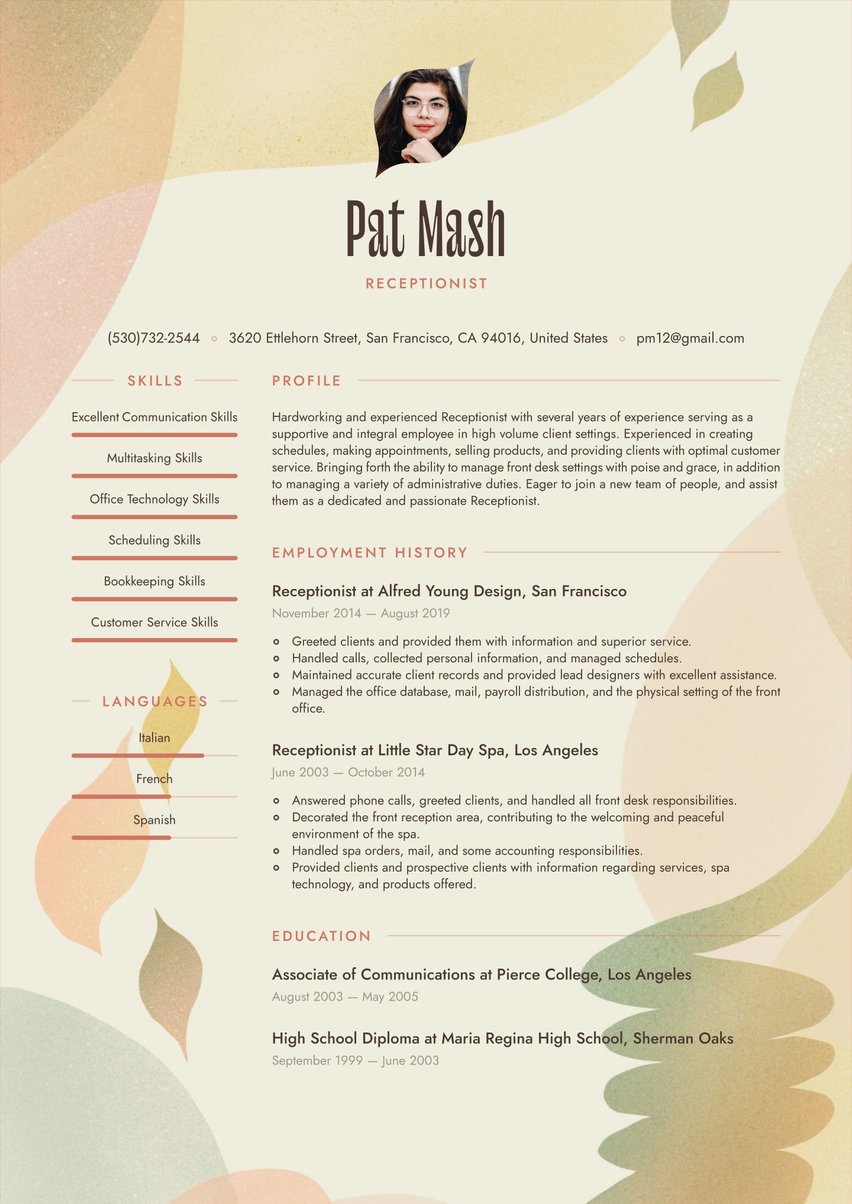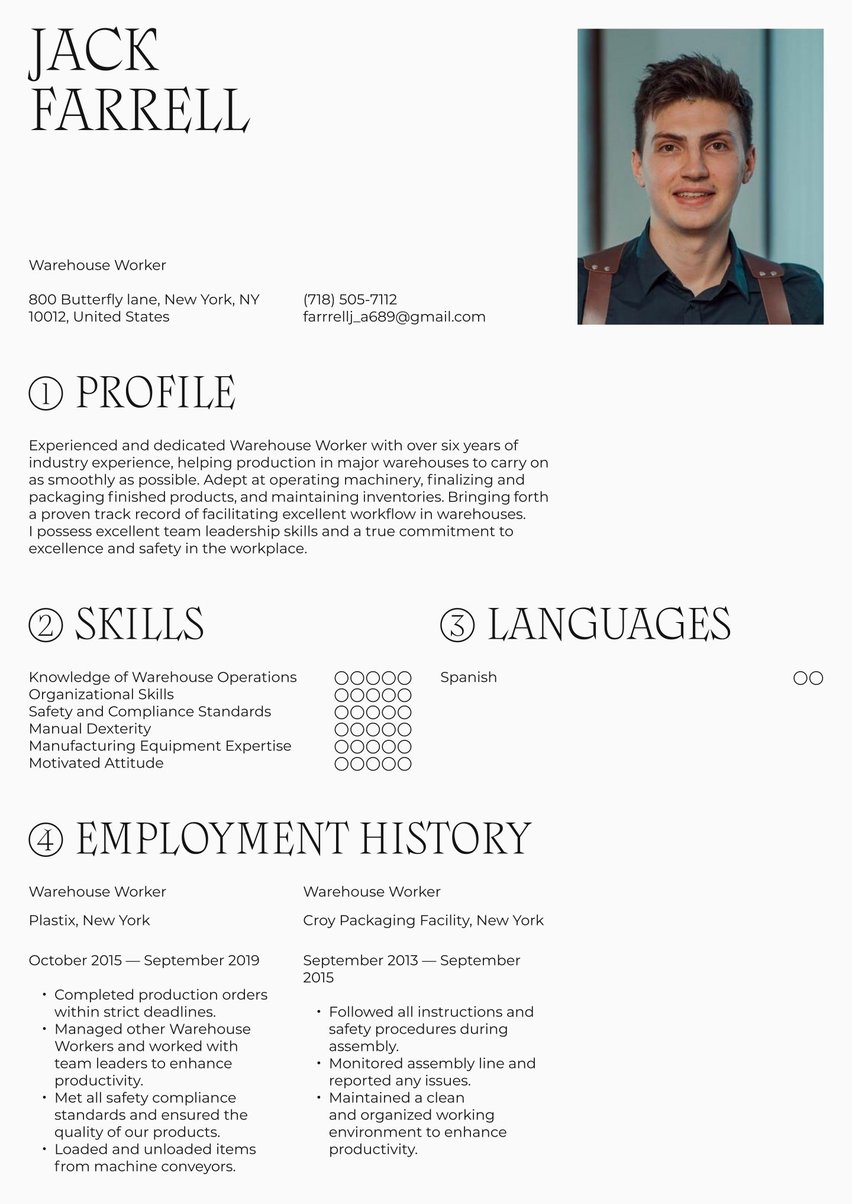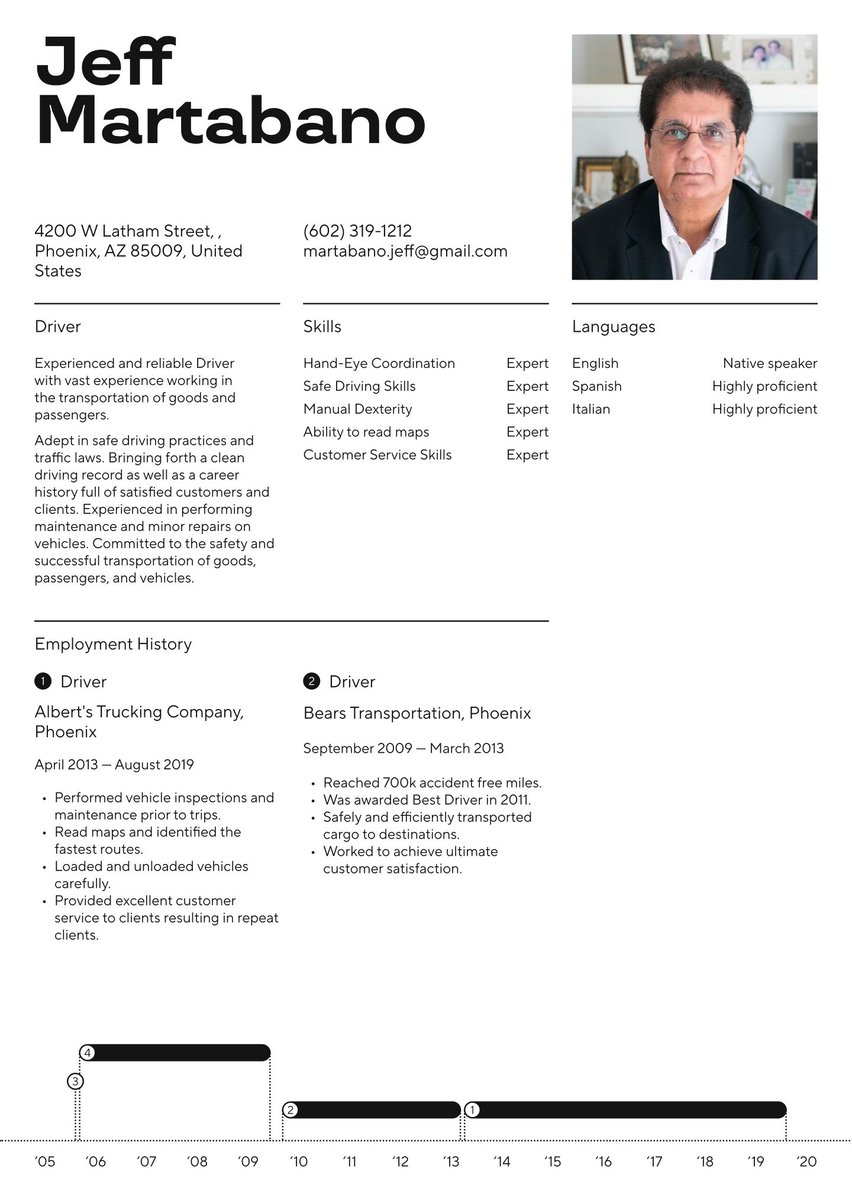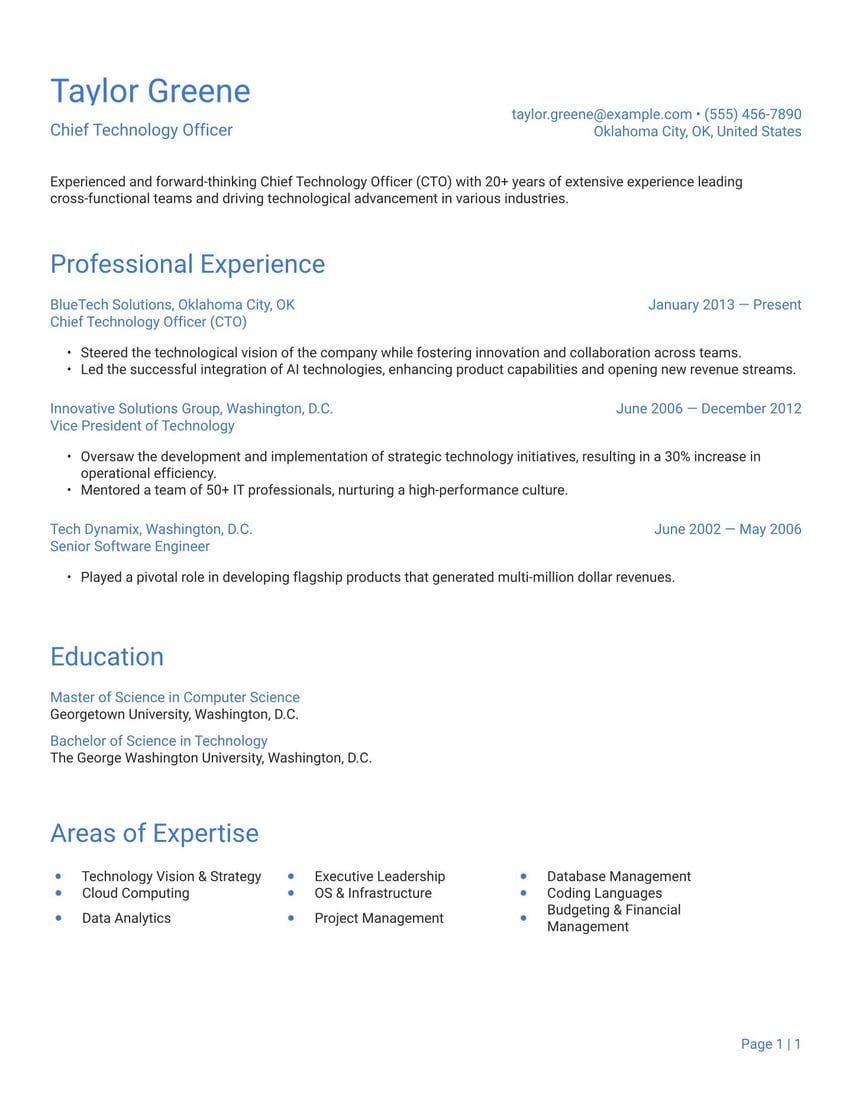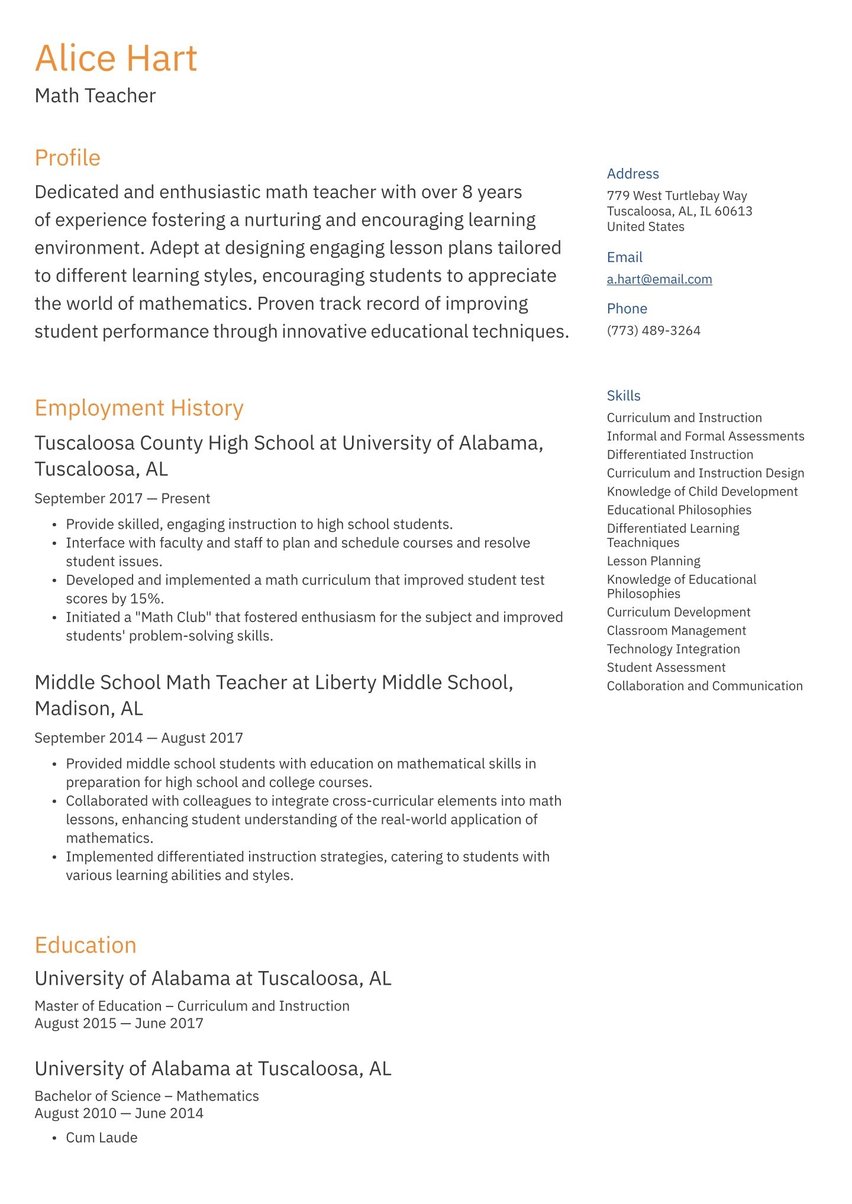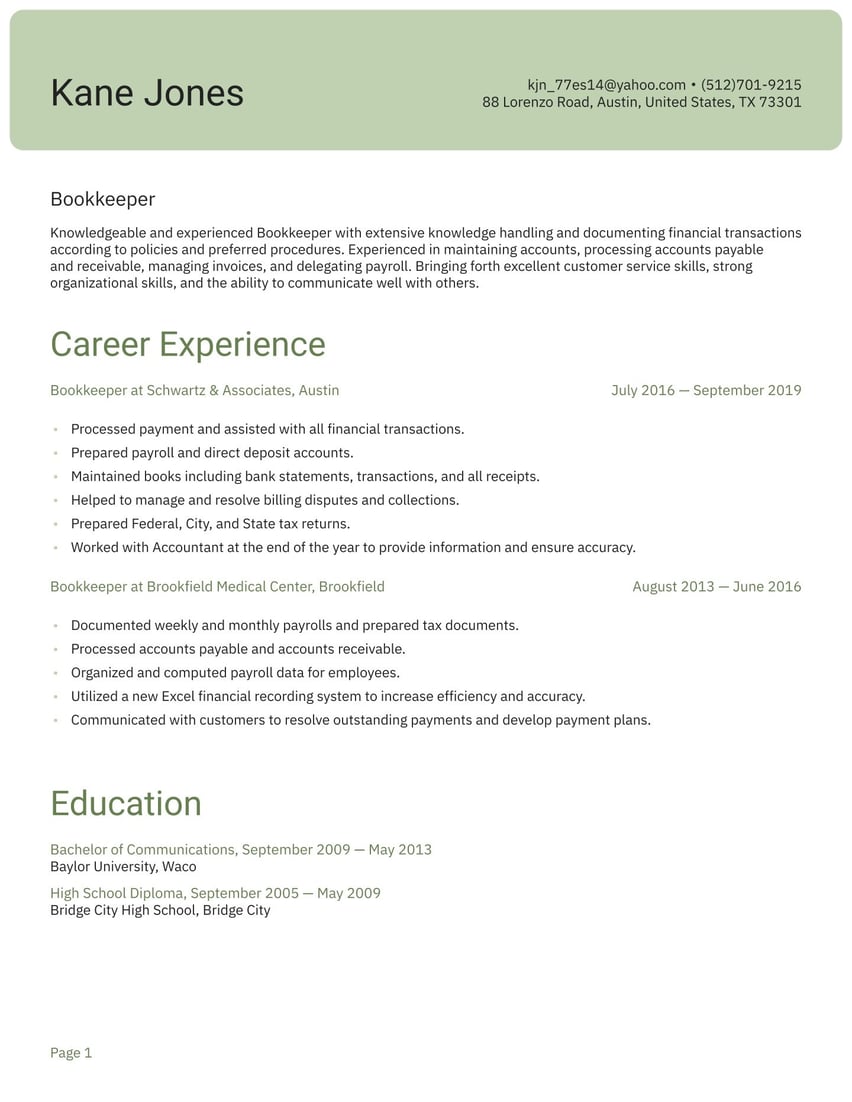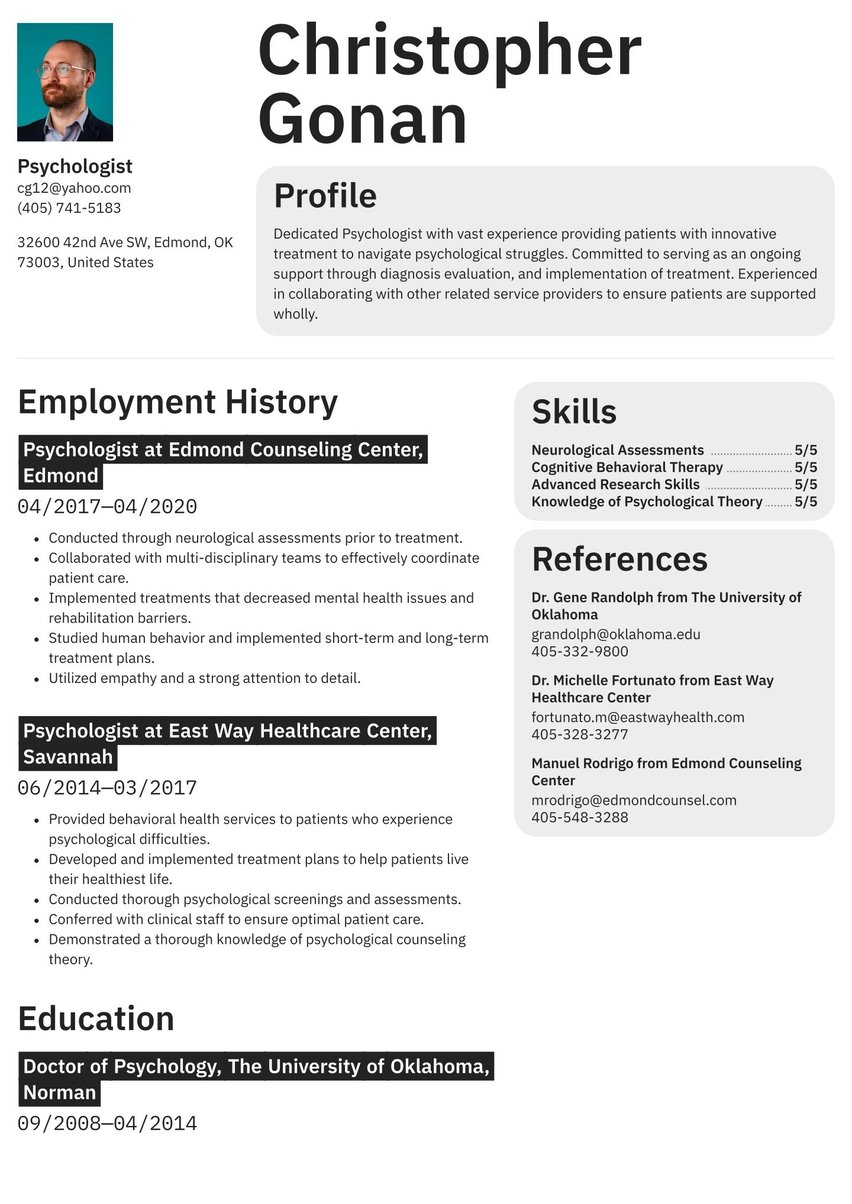Property managers are real estate professionals who oversee and manage properties. Whether organizing routine maintenance or troubleshooting unforeseen issues, they ensure that an apartment or office building has everything it needs to function properly.
Property Manager resume examples by experience level
Your property manager resume is an essential tool to show potential employers that you're a trustworthy and effective guardian of their property.
A successful property manager has excellent communication and multitasking skills and can strategize effectively. That said, a strong property manager resume that portrays these qualities is essential to your job search.
Resume guide for a property manager resume
Resume.io is a top resource for job seekers across all industries, offering over 500 tailored resume samples and customizable templates.
This resource, showcasing a sample resume for property managers, will assist you in crafting a customized resume that captures recruiters’ attention.
Continue as we explore the essential elements of a property manager resume:
- How to write a property manager resume
- Choosing the best resume format for a property manager
- Including your contact information
- Crafting a strong resume summary
- Highlighting your property management experience
- Listing relevant education and skills
- Selecting the right resume design/layout
- An overview of the property manager job market and salary trends
How to write a property manager resume
When creating your property manager resume, there are specific sections that should be included. Here are the key components to focus on:
- The resume header
- The resume summary (aka profile or personal statement)
- The employment history section
- The resume skills section
- The education section
A property manager resume should highlight a candidate’s ability to manage projects and work well with others. Your resume should showcase your ability to effectively manage multiple properties.
While making sure to focus on your proudest career moments, also make every effort to tailor your resume to the specific property management position and employer. Scrutinize the posted job ad carefully so you can effectively target the organization’s needs and convey that you are an ideal match.
Here are the main points to consider for crafting your property manager resume:
- Emphasize your distinctive property management abilities, relevant certifications, or professional experiences that differentiate you from the competition.
- Showcase measurable achievements, such as improving tenant satisfaction scores or successfully increasing occupancy rates.
- Tailor your resume to align with the specific needs of the property or organization to which you’re applying.
- Optimize your resume for Applicant Tracking Systems (ATS) by incorporating essential phrases like "tenant relations" or "lease administration." Begin with a structure that is straightforward for ATS to analyze and rank.
Optimize for ATS
Most medium to large companies use online application portals to recruit and manage applications. The vast majority of the platforms have applicant tracking systems (ATS) built in. The ATS scans your resume for keywords and ranks it against the other applicants. Only the best candidates are sent to the hiring manager for review. You can avoid being filtered out by automated systems by incorporating keywords naturally throughout your resume.
Keywords are often specific references to skills and experiences that are repeated throughout the job descriptions.
For example, the property management job posting lists the following responsibilities:
- “Maintenance and repairs”
- “Prepare budget”
- “Expenditure reports”
- “Oversee marketing”
- “Adhere to local and federal laws”
For more about using the right keywords for the ATS, check out our article on Resume Keywords.
Choosing the right resume format for a property manager
For many candidates, the preferred resume structure is the reverse chronological format. This design emphasizes your employment history by organizing previous positions from the latest to the oldest. It enables recruiters to easily and quickly assess your career trajectory and duties, making it a popular choice across most sectors.
While the functional format can suit those whose expertise is more relevant than their job timeline, it is not as widely accepted by employers. This style focuses on skills rather than specific job titles, which may be advantageous if your practical knowledge surpasses your years of experience.
Nonetheless, in light of today’s employment landscape, we highly advocate for the reverse chronological format.
Include your contact information
The last thing you need is having a company love your work experience but not being able to contact you. It happens more than you may think. Be sure to include your contact information so you don’t miss out on your dream job.
Include:
- Full name and desired role. Clearly state your first and last name, along with the specific property management position you are pursuing.
- Email address. Utilize a simple email format, such as [email protected].
- Phone number. Include a reliable phone number for easy contact by potential employers.
- Location. Only list your city and state; there’s no need for your full address. If you’re willing to relocate, add "Willing to Relocate."
- LinkedIn profile. Include your LinkedIn link if it’s up-to-date and relevant to the role.
Avoid including:
- Birth date. Omit this to minimize the risk of age discrimination.
- Personal information. Do not include details like marital status, Social Security number, or passport information.
- Photo. Avoid adding a picture, as it may lead to bias.
Eddy Flinmann
Rent Slinger
555 Pennsylvania Ave, Jersey, City NJ 04724
065-525-3365
Create a strong resume summary
The resume summary gives an overview of your professional experience and motivations for applying to the position. Highlight your most impressive accomplishments and attributes here. Use as many powerful action verbs as you can. A great summary shows that you're an organized property manager who works well under pressure. If you have necessary or relevant certifications or are licensed, you can also mention that here.
The summary—sometimes called the profile or personal statement—is also the only place on your resume where you have a chance to show off a bit of your personality. You can put yourself ahead of other candidates by coming across as professional, personable, and polite—important traits for property managers who spend a lot of time dealing with people.
To craft an exceptional professional summary, reflect on your most impressive traits and articulate them clearly. This section is an excellent chance to highlight any notable achievements that set you apart.
For instance, you might have received accolades for your property management skills or for optimizing operations in your previous positions. Has your management increased tenant retention? You could also mention your proficiency in inventory management or any unique responsibilities you've handled. This is your opportunity to showcase your value to prospective employers.
Steer clear of common phrases and cliches "team player" or "driven." Rather, illustrate a specific scenario in which you demonstrated those qualities to enhance your employer's success.
Need some inspiration for your summary? We have several resumes relevant to the real estate field:
You can find an example property manager resume summary below:
Highly organized property manager, supporting tenant relations, coordinating maintenance requests, and managing lease documentation. Known for providing excellent customer service and fostering positive tenant relationships. Skilled in budgeting, property inspections, and collaborating with vendors to ensure property upkeep. Eager to bring a hands-on approach and grow within a dynamic property management team.
Accomplished, certified Property Manager with a proven track record of exceeding company’s closing rate by 82% and increasing property values by up to 67%. Committed to achieving client satisfaction, and meeting and exceeding goals. Oversee the management of more than 400,000 square feet of office and retail facilities in the Jersey City area.
Senior property manager with 15+ years of managing portfolios totaling 500+ units, consistently achieving 95%+ occupancy rates and reducing operational costs by 20% through strategic vendor negotiations and proactive maintenance. Skilled in lease negotiations, financial planning, and risk management, with a proven track record of increasing tenant retention by 30% and enhancing property value across multi-million-dollar assets.
Outline your property manager work experience: build a strong foundation
Employment history is one of the most essential resume sections. Organize your work experience highlights by listing the company name, your job title, the date, and the location. Present your work history in reverse chronological order, starting with your most recent role and progressing backward to include at least three pertinent examples.
Below each position, create up to five bullet points describing your key contributions in that role, emphasizing how the employer benefited. Focus on the most relevant and impressive positions and accomplishments. Use powerful action verbs and provide context whenever possible. To increase your chances of landing the position, customize your resume based on the employer's posted job description.
Incorporating metrics can significantly strengthen your statements. Consider detailing the number of properties you oversaw, the size of the teams you managed, or the occupancy rates you achieved. These data points demonstrate your capability to handle challenges and your commitment to high standards in your performance.
Ultimately, emphasize how your contributions made a positive impact to highlight your worth to potential employers. For example, instead of generic phrases like:
- Reviewed the selection process for maintenance and repair contractors.
- Worked with legal and communications teams to revise the wording of leasing contracts.
- Adjusted leasing and retention strategies to address tenant satisfaction.
Use specifics and numbers to quantify results and demonstrate the impact you’ve made with stronger value-based bullets like:
- Fine-tuned the selection process for maintenance and repair contractors and strengthened relationships with existing service providers, attaining 27% cost savings and 38% fewer reworks.
- Consulted with legal and communications advisers to streamline and simplify the wording of all leasing contracts, with 100% positive feedback.
- Improved closing rate was offset by 26% increase in tenant retention.
Property Manager at Blacksell Property Leasing, Jersey City
2015 - June 2022
- Managed 20+ properties with enthusiasm, expertise, and dedication.
- Developed and implemented proven marketing strategies for each property, using evaluation metrics to improve effectiveness.
- Fine-tuned the selection process for maintenance and repair contractors and strengthened relationships with existing service providers, attaining 27% cost savings and 38% fewer reworks.
- Consulted with legal and communications advisers to streamline and simplify the wording of all leasing contracts, with 100% positive feedback.
- Improved closing rate was offset by 26% increase in tenant retention.
- Helped the company achieve industry awards — PMA awards for Leasing Maintenance and Professional Marketing and Advertising Excellence; and the IREM Corporate Excellence award.
Property Manager at Property Management New York Silver, New York City
2007 - 2015
- Achieved budget savings of 23% while maintaining or upgrading the visual appearance and condition of properties to attract and retain tenants.
- Contributed to 43% overall income increases during a five-year period, partly by cutting expenses by 27%.
- Developed and implemented a training program for office support staff, reducing the error rate by 32% and improving retention rate by 35%.
How to write a property manager resume with no experience
If you haven’t yet worked in property management, there’s no need to worry. Relevant experiences can effectively showcase your skills and commitment to the field.
Here are several ways to make a strong impression on hiring managers, even without direct property management experience:
- Highlight transferable skills that demonstrate your dependability and professional integrity. Emphasize your ability to manage budgets, handle tenant relations, and coordinate maintenance requests.
- Include any relevant volunteer work, internships, or personal projects where you’ve overseen property maintenance or facilitated rental agreements.
- Showcase essential soft skills such as conflict resolution and effective communication, which are vital in property management roles.
Include the relevant key skills to qualify for property manager roles
The skills section is one of the most important in your property manager resume. Try to include a mixture of hard and soft skills based on the job.
Hard skills can include budgeting, property management software, or maintenance/handyman skills. You can also refer to the job description for any hard skills that are essential for your resume.
Promote your managerial strengths in the soft skills you list, especially interpersonal skills. Good communication skills, customer service skills, and organizational skills are also essential for a property manager position.
Your key skills shouldn’t be confined to a single section of your resume. Integrate them throughout your document by showcasing them in real-world applications. Boost the validity of these competencies by including concrete examples and accomplishments that illustrate your expertise.
According to a Buildium survey on 2023 industry trends, leasing technology is going to play a big role in the revenue-generation strategy of property managers for the next two years.
Here’s what the skills box looks like in our property manager resume template.
Key Skills and Proficiencies
Detail your education & relevant property manager certifications
Since many of a property manager's skills can be learned on the job, your resume's education section may not be lengthy. List your high school only if it is the highest education you've completed.
Otherwise, mention any diploma or certificate courses you have completed, as well as any degrees. These should appear in reverse chronological order, from highest to lowest level. Also mention on-the-job training, professional development offerings through a peer association, or certifications you’ve obtained.
For instance, the Certified Property Manager (CPM) credential is a well-recognized certification offered by the Institute of Real Estate Management (IREM). It's considered the gold standard for property managers.
Associate of English, Hunter College, New York City
2001 - 2005
High School Diploma, Dominican Academy, New York City
1997 - 2001
Pick the right resume layout and design for your property manager resume
When building owners look at your property management resume, they are evaluating its visual appearance just as much as the words on the page. Choosing the appropriate layout, design, and formatting elements is vital to ensuring your resume looks professional and polished.
Make sure to pay attention to your font style and sizes as well as the balance of white space to text. San serif fonts like Helvetica, Georgia, or Arial are standard for resumes because of their clean appearance.
If you don't have time to fight with word processors over layout, design and formatting choices, using one of our expert resume templates may be helpful. For property managers, we recommend those in the professional style category, with clean lines and great organization.
Follow these tips to make sure your property manager resume is up to code.
- Choose a layout that's easy to read
- Keep your font size between 10 and 12 point
- Include a header with your name and contact information
- Overload your resume with text
- Use more than two different font styles
- Create a resume longer than one page
Property manager text-only resume example
Profile
Accomplished, certified Property Manager with a proven track record of exceeding company’s closing rate by 82% and increasing property values by up to 67%. Committed to achieving client satisfaction, and meeting and exceeding goals. Oversee the management of more than 400,000 square feet of office and retail facilities in the Jersey City area.
Employment history
Property Manager at Blacksell Property Leasing, Jersey City
2015 - June 2022
- Managed 20+ properties with enthusiasm, expertise, and dedication.
- Developed and implemented proven marketing strategies for each property, using evaluation metrics to improve effectiveness.
- Fine-tuned the selection process for maintenance and repair contractors and strengthened relationships with existing service providers, attaining 27% cost savings and 38% fewer reworks.
- Consulted with legal and communications advisers to streamline and simplify the wording of all leasing contracts, with 100% positive feedback.
- Improved closing rate was offset by 26% increase in tenant retention.
- Helped the company achieve industry awards — PMA awards for Leasing Maintenance and Professional Marketing and Advertising Excellence; and the IREM Corporate Excellence award.
Property Manager at Property Management New York Silver, New York City
2007 - 2015
- Achieved budget savings of 23% while maintaining or upgrading the visual appearance and condition of properties to attract and retain tenants.
- Contributed to 43% overall income increases during a five-year period, partly by cutting expenses by 27%.
- Developed and implemented a training program for office support staff, reducing the error rate by 32% and improving retention rate by 35%.
Skills
- Management Skills
- Marketing Skills
- Interpersonal Communication Skills
- Real Estate Knowlegde
- Negotiation Skills
Education
Associate of English, Hunter College, New York City
2001 - 2005
High School Diploma, Dominican Academy, New York City
1997 - 2001
Property manager job market and outlook
The job market for property, real estate, and community association managers is anticipated to expand by 3% between 2023 and 2033, which aligns with the average growth rate across all professions.
On average, there are expected to be around 37,800 annual job openings for property, real estate, and community association managers over the next ten years. A significant portion of these vacancies will likely arise from the necessity to fill positions left by individuals who change careers or leave the workforce, including those who retire.
What type of salary you can expect in property management
According to the Bureau of Labor Statistics, the median annual wage for property, real estate, and community association managers was $62,850 in May 2023.
Key takeaways for a property manager resume
To create an effective property manager resume, focus on showcasing your unique skills and achievements that highlight your qualifications for the role. Tailor your resume to align with specific job requirements and emphasize your experience in managing properties, maintaining tenant relations, and optimizing operations.
Incorporating metrics can strengthen your statements, demonstrating your ability to enhance property values or tenant satisfaction. Remember to keep your resume well-organized, visually appealing, and optimized for Applicant Tracking Systems (ATS) by including relevant keywords.
Don’t let your resume be a fixer-upper. Start your job search with a resume builder, but why stop there?
With resume.io’s 18 powerful tools, you can search for jobs, track your journey, prepare for interviews, and negotiate salaries—all with our all-inclusive career toolkit at your fingertips.


.jpg)

.jpg)
